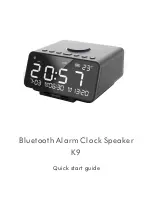
16 Intelligent Products—2251J Plug-In Low Profile Intelligent Photoelectronic Smoke Detector
This smoke detector is designed to activate and initiate emergency action,
but will do so only when used in conjunction with other equipment. This
detector is designed for installation in accordance with NFPA Standard
72-National Fire Alarm Code, or equivalent codes and standards
applicable to country of installation.
●
Smoke detectors will not work without power. Alternating Current
(AC) or Direct Current (DC) powered smoke detectors will not work
if the power supply is cut off for any reason.
●
Smoke detectors will not sense fires that start where smoke does not
reach the detectors. Smoke from fires in chimneys, in walls, on roofs,
or on the other side of closed doors may not reach the smoke detector
and alarm it.
●
A detector may not detect a fire developing on another level of a
building. For this reason, detectors should be located on every level
of a building.
●
Smoke detectors have sensing limitations. Ionization detectors offer a
broad range fire-sensing capability, but they are better at detecting
fast, flaming fires than slow, smoldering fires. Photoelectronic
detectors sense smoldering fires better than flaming fires. Because
fires develop in different ways, and are often unpredictable in their
growth, neither type of detector is always best, and a given detector
may not always provide warning of a fire. In general, detectors
cannot be expected to provide warnings for fires resulting from
inadequate fire protection practices, violent explosions, escaping gas,
improper storage of flammable liquids like cleaning solvents, other
safety hazards, or arson.
This detector is UL Listed to operate in a maximum air velocity of
3000 ft/min. Air velocity, along with other factors, may affect
detector sensitivity. See the 1993 NFPA 72-National Fire Alarm
Code, Appendix B for information.
●
Test your smoke detector system per NFPA 72-National Fire Alarm
Code, or equivalent codes and standards applicable to country of
installation, at least semiannually. Clean and take care of your smoke
detectors regularly. Taking care of the fire detection system you have
installed will measurably reduce your product liability risks.
Limitations
Controls Group
FAN 408
507 E. Michigan Street
Fire Initiating Devices and Notification Appliances Technical Manual
P.O. Box 423
Printed in U.S.A.
Milwaukee, WI 53201

































